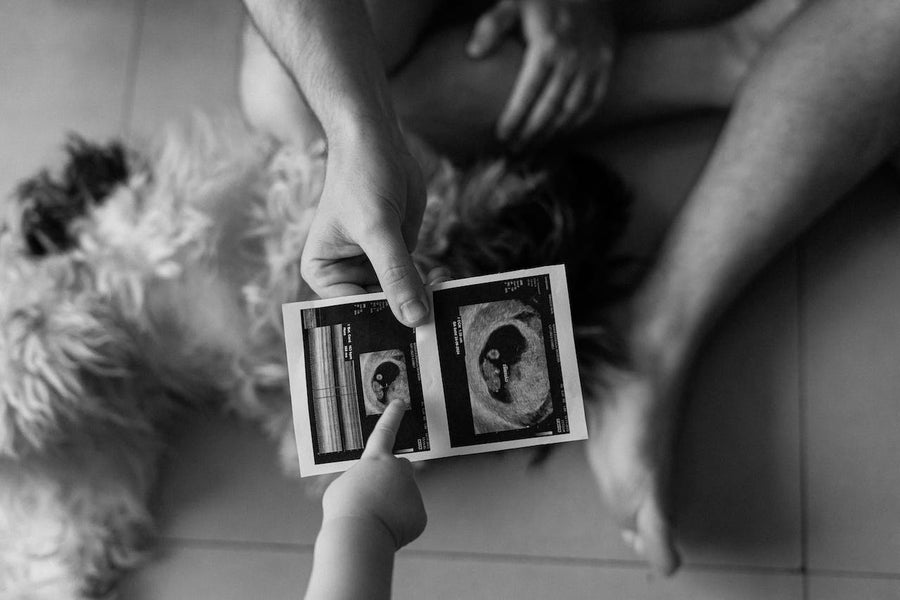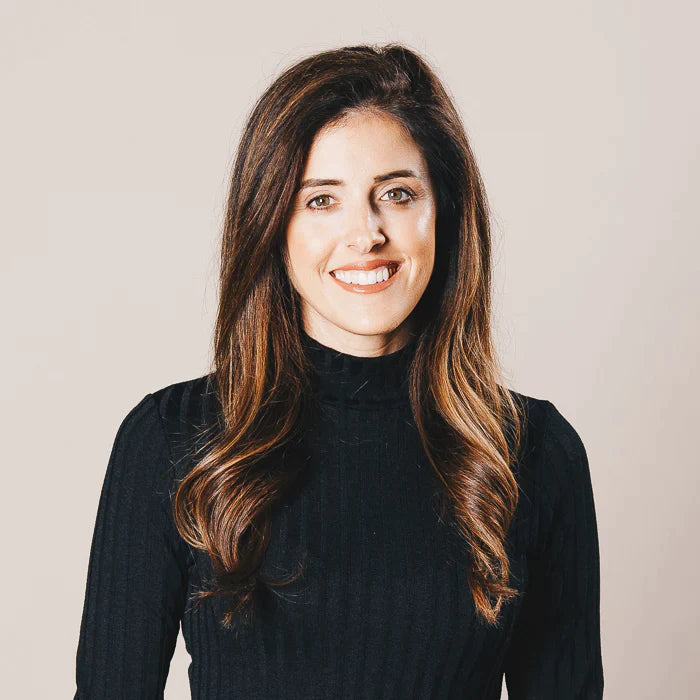Can We Please Stop Using The Term Geriatric Pregnancy?

By Halle Tecco, MBA, MPH
Every time I hear a pregnancy be referred to as “geriatric”, I cringe. Take Meghan Markle, who carried her babies at 37 and 39, referred to as “geriatric” in the media. Her experiences, like those of many women in their late 30s and 40s, challenge the outdated notion encapsulated in the term "geriatric pregnancy."
This label, steeped in historical context, fails to acknowledge the evolving landscape of maternal health and societal norms. The term carries connotations of frailty and decline, which simply isn’t the case for most women.
I think it’s time we retire this term, and replace it with language that accurately reflects the experiences and realities of today's expectant mothers

What Is a Geriatric Pregnancy?
The term "geriatric pregnancy" has traditionally been used to describe pregnancy in women who get pregnant over the age 35. However, it’s already on its way out.
The American College of Obstetricians and Gynecologists (ACOG) has adopted the term "advanced maternal age" instead. [1] I like this term slightly better, and I understand the desire to label those who have a higher risk of pregnancy complications due to age. However, why can’t we just say “women over 35”?
With the average age of first-time mothers rising, these terms are increasingly misaligned with current social norms and medical understanding. [2]
More and More Women Are Having Babies After Age 35
“Older” moms are having a moment, and it’s been trending this way for a while. In 2021, the birth rate for women aged 35–39 was up 5% from 2020, and the birth rate for women 40-44 was up 2%. Birth rates for women in these age groups have gone up since the early 1990s, while the birth rate for women 20-29 has decreased. [2]
This noticeable shift in the age at which women are choosing to have children can be attributed to a variety of social, economic, and personal factors:
- Educational attainment: Higher levels of education correlate with later childbearing. As more women pursue undergraduate and graduate degrees, the time dedicated to education extends into the years traditionally associated with starting a family. This delay in childbearing can be attributed to the time and focus required for academic pursuits. [5]
- Career: Increased participation of women in the workforce is a significant factor. As women continue to make strides in various professional fields, they often prioritize establishing and advancing their careers, which can lead to delaying starting a family. [5]
- Delays in marriage: The average age at first marriage has been steadily rising. This delay is often linked to factors like educational and career pursuits, personal choice, and changing societal norms. Since marriage is traditionally associated with starting a family, this postponement often leads to later pregnancies. [5]
- Advances in reproductive technologies: Advances in reproductive technology, such as IVF (in vitro fertilization) and egg freezing, have given women more options and control over their reproductive timeline. [6] Learn more about fertility treatment options and fertility preservation.
There are as many reasons for delaying motherhood as there are mothers. But even using the term “delaying” when speaking about when people choose to have children is problematic. It implies that there is an ideal or standard timeline for when a woman should have children. This notion enforces a traditional view that doesn’t reflect the diverse realities and choices of women today.
Each woman’s decision about when to have children is influenced by a unique combination of personal, professional, societal, and health factors. By moving away from a one-size-fits-all approach and recognizing the varied (and very valid!) reasons for choosing to have children after 35, society can better support and respect the individual choices of women in their journey towards motherhood. Read an OBGYN’s guide to getting pregnant in your 30’s and 40’s.
The Truth About Pregnancy Over Age 35
Medically, pregnancies after 35 are associated with a higher risk of complications such as high blood pressure, gestational diabetes, the need for a cesarean section (C-section), premature birth, and having a baby with a low birth weight, as well as an increased risk of miscarriage [3]. These risks are attributed to various physiological changes and increased susceptibility to certain conditions as women age.
- High blood pressure: Older pregnant women are more likely to develop hypertension, which can lead to further complications like preeclampsia, a serious condition that can harm both the mother and the baby if left untreated.
- Gestational diabetes: The risk of developing gestational diabetes, a type of diabetes that occurs during pregnancy, is higher in women over 35. This condition can affect the pregnancy and the baby's health and often requires careful monitoring and management.
- Needing a C-section: Advanced maternal age is linked to an increased likelihood of requiring a cesarean section. This may be due to various factors, including the higher prevalence of complications that can make vaginal delivery riskier.
- Premature birth and low birth weight: Older mothers face a higher risk of preterm labor, leading to premature birth. Babies born prematurely may have low birth weights and are at risk for health problems both immediately after birth and later in life.
- Chromosomal conditions: Babies born to older mothers have a higher risk of certain chromosomal conditions, such as Down syndrome.
- Miscarriage: The risk of miscarriage increases with maternal age. This is often related to an increased likelihood of chromosomal abnormalities in the fetus, which can occur more frequently in eggs from older women.
It’s easy to be scared by hearing the chances of these conditions are higher if you’re over 35, but what we really need to know is how much higher?
For example, women age 20 have a 1 in 250 chance of having a baby with Trisomy 21 (Down syndrome) compared to 1 in 714 for women age 30 and 1 in 86 for women age 40. So even at age 40, your chance of having a baby with Trisomy 21 is still only 1.2% [1].
On the other hand, the rate of miscarriage goes up quite a bit the older you are. At age 35, you have about a 20% risk. At age 40, the risk is about 33% to 40%. And at age 45, it ranges from 57% to 80% [4].
All that being said, many women over 35 still go on to have healthy pregnancies.
Summing It Up
As we navigate the changing landscape of motherhood and family planning, it's time to reassess the language and perceptions surrounding it. The term "geriatric pregnancy," a relic of a past era, is increasingly incongruent with the lived experiences of many women today. This terminology not only fails to capture the nuances of modern maternal health but also imposes outdated notions of age and fertility.
The move by the American College of Obstetricians and Gynecologists (ACOG) to adopt "advanced maternal age" in place of "geriatric pregnancy" is a step in the right direction. It's more reflective of the real risks without the negative connotations. However, the question remains: why can’t we simply say "women over 35"? This simple yet inclusive description can help dismantle the stigma attached to older motherhood.
The upward trend in the age of first-time mothers is influenced by factors like educational attainment, career development, delays in marriage, and advances in reproductive technologies. These factors, each significant in its own right, contribute to the decision to delay motherhood – a term that itself implies a deviation from an 'ideal' timeline. Remember, there is no universal 'right time' to start a family, and there are diverse and valid reasons women choose to start motherhood after 35.
Remember, there is no universal 'right time' to start a family, and there are diverse and valid reasons women choose to start motherhood after 35.
While it's true that pregnancies after 35 come with increased medical risks, such as higher chances of high blood pressure, gestational diabetes, and miscarriage, it's important to contextualize these risks. Talk to your healthcare provider about what you can do to increase your chances of a healthy pregnancy.
At Natalist, we aim to support your path to and through parenthood, no matter what that looks like. You can find expert-written blogs here, or browse a wide variety of high-quality, evidence-backed products to support you from concept to conception, and beyond. Shop vitamins and supplements, self-care items, or fertility tests.
References:
- Pregnancy at Age 35 Years or Older. ACOG. URL. Accessed November 2023.
- Births: Final Data for 2021. National Vital Statistics Reports. Volume 72, Number 1. CDC. URL.
- Pregnancy after 35: Healthy moms, healthy babies. Mayo Clinic. URL. Accessed November 2023.
- Miscarriage. Mayo Clinic. URL. Accessed November 2023.
- They’re Waiting Longer, but U.S. Women Today More Likely to Have Children Than a Decade Ago. Pew Research. URL. Accessed November 2023.
- Molina-García L, Hidalgo-Ruiz M, Cocera-Ruíz EM, Conde-Puertas E, Delgado-Rodríguez M, Martínez-Galiano JM. The delay of motherhood: Reasons, determinants, time used to achieve pregnancy, and maternal anxiety level. PLoS One. 2019;14(12):e0227063. Published 2019 Dec 30. doi:10.1371/journal.pone.0227063
Halle Tecco is the Founder of Natalist. She is an Adjunct Professor at Columbia Business School, the host of The Heart of Healthcare Podcast, and a Board Member at Resolve. Halle has appeared in The New York Times, The Wall Street Journal, and CNBC. She was named one of the Most Creative People in Business in 2023 by Fast Company, one of Goldman Sachs’ Most Intriguing Entrepreneurs, and listed on the Forbes 30 under 30. She received her MBA from Harvard Business School and her MPH from Johns Hopkins University.
Reach Out, We're Here
Have questions about your order or products? For the speediest answer, check out our FAQ section. Need something else? Come find us below.
Please keep in mind our regular business hours; Monday-Friday, 9am-5pm CT.
Customer Support
support@natalist.com
Press Inquiries
media@everlyhealth.com
Business & Partnerships
team@natalist.com
Affiliates + Influencers
team@natalist.com
Job Openings
Careers Page

























